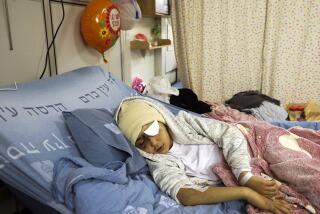Schroeder Pushes Probe of Boy’s Death
- Share via
BERLIN — Stepping warily into a case of alleged neo-Nazi torture and killing of a 6-year-old boy, German Chancellor Gerhard Schroeder on Monday comforted the dead child’s mother and urged authorities in the eastern state of Saxony to thoroughly investigate claims of a racist motive in the boy’s 1997 drowning.
But as Schroeder met with Renate Kantelberg-Abdulla to hear her shocking allegations that her son was murdered and the killing covered up by a community that hated her Iraqi-born husband, police released three suspects who were arrested last week. Authorities said they had no evidence from credible witnesses to warrant an indictment.
“It has been concluded that grounds for charges against the three suspects cannot be supported,” chief prosecutor Hans Strobl told reporters in Dresden, the capital of Saxony, after investigators spent the weekend questioning those who gave the dead boy’s parents sworn eyewitness statements.
Joseph Abdulla’s drowning June 13, 1997, was ruled an accident after a yearlong investigation. The parents claim the probe was botched and carried out by police and prosecutors indifferent to the plight of non-Germans in the restless eastern region.
The child’s death at a community swimming pool in the town of Sebnitz on the Czech border has dominated newspaper and television headlines since Kantelberg-Abdulla released the witness statements last week.
The 15 statements contend that the boy was hounded by skinheads while playing without adult supervision in the wading area of a pool, tortured with an electroshock device and force-fed a sedative before his motionless body was thrown in the pool’s deep end. The witnesses say that as many as 200 bathers looked on but did nothing to help the terrified child and never came forward to tell police how he died.
But Saxony officials who ordered the release of the three suspects, two men and a woman in their early 20s, said that the grieving parents had paid witnesses to provide the sworn testimony and that some of the most disturbing allegations had been discredited by investigators.
“At this stage of the investigation, we no longer suspect a far-right motivation” for the boy’s death, Strobl said, adding that fresh interrogations had “cast general doubt on the credibility of the witnesses.”
Because the case has come to public attention at a time when right-wing violence against foreigners is on the rise, German leaders initially reacted with outrage at the parents’ accusations that their child was murdered by racist youths who were protected by a community intolerant of outsiders. The child’s father, Saad Abdulla, is an Iraqi immigrant who opened a pharmacy in Sebnitz that competed with one run by the father of the female suspect.
After the grisly details of the child’s alleged torture were published by the Bild am Sonntag newspaper Sunday, a clearly upset Schroeder told journalists here that he was “appalled by the idea that this boy may have been murdered by right-wing extremists.”
“If this proves to be the case, it would be one of the most hideous crimes in Germany for many years,” Schroeder said.
But after Dresden prosecutors announced that they had testimony undermining the veracity of some of the witness statements--as well as reports that witnesses had been paid, although only about $4.50 to $22--Schroeder toned down his remarks and said he was meeting with Kantelberg-Abdulla as a humanitarian gesture.
“The mother has a right to be heard and helped to the extent this is possible,” Schroeder said, urging Saxony officials to take all measures to clarify what happened.
Saxony’s justice minister, Manfred Kolbe, declined to comment on the case except to caution members of the media who have portrayed the child’s death as a hate crime to be careful about making slanderous allegations against an entire town, or risk paying reparations to those unjustly accused.
The only conclusion authorities would make was that the case that has shaken Germans out of their complacency about right-wing radicals will continue to be investigated.
More to Read
Sign up for Essential California
The most important California stories and recommendations in your inbox every morning.
You may occasionally receive promotional content from the Los Angeles Times.











